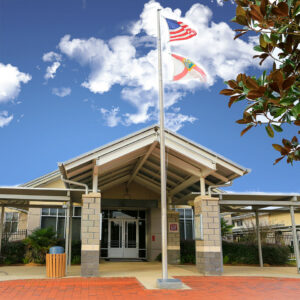Tragic headlines have propelled the issues of student mental health and bullying into the forefront of public discourse. Experts and politicians have mixed feelings on the best way to address these issues. However, a partnership between Florida State University’s College of Education and Florida State University Schools (FSUS) aims to offer students help. Seminoles ASPIRE, which stands for the Alliance for Supporting Positive-growth & Inspiring Resilience in Education, benefits every student attending FSUS but also has far-reaching implications. Furthermore, students in FSU’s combined Counseling Psychology and School Psychology Ph.D. program gain hands-on experience working with youth. Seminoles ASPIRE works as a multi-tiered system. Its broadest scope focuses on providing school-wide assessment services designed to help improve and monitor the general emotional and mental health of FSUS students. ASPIRE also delivers anti-bullying and bullying prevention programming to the entire FSUS student body.

The second and third tier of ASPIRE deliver more focused support. If the team identifies that a student has mental health difficulties, they use more specialized assessments and interventions. Students who are at-risk also may receive some individualized attention and care through small group counseling. The third tier focuses on students with known mental health challenges or have significant risk of mental health difficulties. For these students, ASPIRE provides extra care and attention.
Seminoles ASPIRE Team
Seminoles ASPIRE is co-directed by Dr. Lyndsay Jenkins, assistant professor and coordinator the FSU School Psychology program. Jenkins’ research focuses on bullying prevention, and she also spearheads the Bullying and Trauma Prevention Research Group. Her work earned her the Alberti Center for Bullying Abuse Prevention Early Career Award for distinguished scholarly contributions. Her leadership and knowledge of school mental health practices and bullying prevention help the Seminoles ASPIRE team give students at FSUS the attention they deserve. “In less than one year, we have implemented a program where every single K-12 student is now receiving instruction in social and emotional learning,” says Jenkins. “We have provided individual counseling to over 30 6-12th grade students and are beginning counseling groups this month! I am so proud of what the Seminoles ASPIRE team of clinicians have been able to accomplish in the last year!” In addition to Jenkins, ASPIRE consists of fellow co-director Dr. Deborah Ebener, professor and director of clinical training in our combined Counseling Psychology and School Psychology Ph.D. program. Ebener supervises the graduate students who work directly with students at FSUS. A licensed psychologist, Ebener has worked with clients of all ages through her private practice in Tallahassee. At FSUS, Jennifer Kinney serves as the student services director and is heavily involved in the program. A certified school counselor for grades 6-12, Kinney focuses her efforts on ensuring that FSUS students receive the best care possible. “We strive to equip students, teachers, and staff with the tools needed to start a conversation, identify a student experiencing a crisis, and how to respond to get the student the help they need,” Kinney says. “By increasing awareness and offering prevention support services, we are positively impacting the social-emotional well-being of our students by providing them with the necessary skills to be productive members of our community.”
Benefiting All Students
While the primary objective of Seminoles ASPIRE is to provide the students with FSUS with mental health care, graduate students at FSU also benefit. A number of doctoral students in the combined Counseling Psychology and School Psychology program work on the ASPIRE team. These students gain practicum experience that prepares them to help students around the country after graduation. Dasha Highsmith works as a doctoral students involved in the ASPIRE program. “My experience with Seminoles ASPIRE has been a wonderful addition to my clinical training,” Highsmith says. “Having a background in school psychology, I always envisioned having consistent mental health services for students. This program and its services are exactly what I ‘aspired’ to have in my post-doctoral career. This is our second semester at FSUS and the program has grown considerably since its inception in January 2019. This opportunity has provided a unique experience for our combined doctoral program and the students at FSUS. The response has been far beyond positive.” Furthermore, the Seminoles ASPIRE program offers researchers an opportunity to look at bullying prevention methods. As students interact with the ASPIRE program, Jenkins and her team collect data which will help influence future strategies. In this way, ASPIRE is not only providing students with immediate care, but it also provides future students with potentially improved or proven programming. With Seminoles ASPIRE, the future is brighter for students at FSUS. With the research that will come out of the partnership, students around the country will gain access to better prevention and intervention programming. Making our schools a safer and healthier place starts with partnerships like ASPIRE. Jenkins, Ebener, and their team of graduate students make an impact not only in Tallahassee, but their research could change the lives of students across America.


